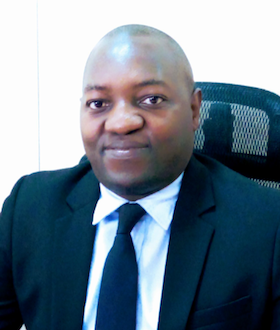 Benedict Makanga
Benedict Makanga
Personal Assistant to the Deputy Governor
Bank of Uganda
GRIPS Global Governance Program (Ph.D. ’18)
Please tell us about your career path so far. What is your area of specialization and how did you come to work in this area?
I started my career in 2003 as a Statistician managing and analyzing different sets of data in the Uganda Bureau of Statistics, after I had completed my Bachelor of Science degree in Quantitative Economics from Makerere University, Uganda. My dream was to further my career in development economics tackling issues mainly focused on poverty, conflict and human capital development (health and education) which in my view were serious challenges the world was grappling with especially in low developed countries like Uganda. In 2005, I was offered a job opportunity at Centenary Rural Development Bank as a Credit Officer and was deployed in one of the Bank’s rural branches. This is the largest local Bank in Uganda primarily involved in the promotion of development through loans to rural farmers, processors of agricultural produce, small traders and small manufacturers. As a Credit Officer, I extended microloans to several rural businesses and rural households and this clearly showed me the role microfinance loans play in encouraging entrepreneurship, increasing income-generating activities thus reducing poverty, empowering the poor (especially women), increasing access to health and education, and building social capital among poor and vulnerable communities. In 2007, I joined the central bank of Uganda (Bank of Uganda) and have continued to work here up to today. For the thirteen years I have been at the Bank of Uganda, I have held various positions in different departments including the Human Resource & Administration Department, Banking Department and the Office of the Deputy Governor, and have grown through the ranks to the level of Assistant Director. I have over the years developed myself and my academic qualifications are quite diverse ranging from Economics, Finance, Management and Public Policy. I hold a Master of Business Administration (Finance Major) and a Post Graduate Diploma in Human Resource Management. In 2016, I obtained an MA in Advanced Policy Studies from GRIPS and graduated in 2018 with a Ph.D. in Advanced Policy Studies, also from GRIPS. My diverse qualifications, exposure and experience over the years have enabled me to work in different areas, and this has greatly contributed to my agility and adaptability in different specializations.
You are currently serving as Personal Assistant to the Deputy Governor of the Bank of Uganda. What are your main roles and responsibilities?
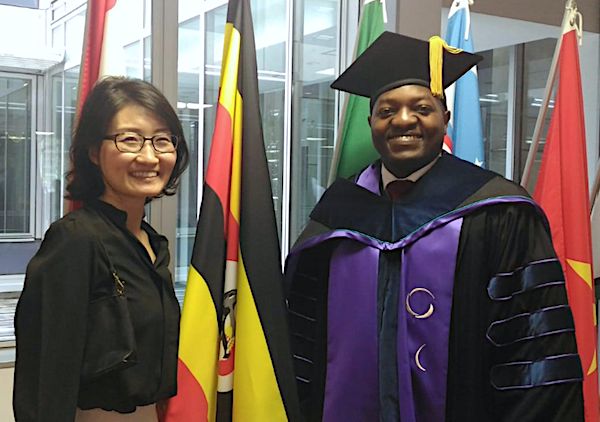
Benedict with his main supervisor, Prof. Yoko Kijima, on graduation day
When I returned from my studies at GRIPS in September 2018, I was initially deployed in the Human Resource Department as a Senior Principal Officer and was charged with the duties of Staff development and training. Later, I was appointed as the Personal Assistant to the Deputy Governor, a role I have held up to today. This position is at a level of an Assistant Director and is quite a demanding and unique job, which involves an all-round understanding of management & leadership roles, Economics, Finance, Public Policy and Business related areas. My main roles involve providing executive, administrative, and development support to the Deputy Governor in carrying out his role with the right information to aid decision-making, the appropriate follow-up on delegated tasks, the optimization of his schedule, with exceptional support to his effective internal and external communication, and by providing advice, when needed, on topical issues related to monetary and fiscal policy among others. I Compose and edit speeches, talking points, presentations, articles for publication, and related documents for the Deputy Governor on a variety of topics and in formats appropriate for varied audiences and venues. I also support strong working relationships and facilitate communication between the Deputy Governor and key stakeholders, including the Governor, the Board of Directors, senior management, staff, and stakeholders – channeling their needs, concerns, and ideas in an effective and efficient way. I also keep the Deputy Governor informed of critical and topical public, regional and international issues relevant to the Bank by identifying key ones and trends and acting as a thoughtful sounding board to the Deputy Governor in grappling with different issues, including new ideas and initiatives coupled with serving as a trusted advisor and confidant.
You are also a Trustee of the Pension Scheme for the Bank of Uganda. What does this role entail?
I am a Trustee of the Defined Benefit Scheme of the Bank representing Staff interests on the Board of Trustees of Bank of Uganda. This is the second-largest pension scheme in terms of assets in Uganda after the National Social Security Fund. I was elected by the majority of Staff through a competitive process to represent them on the Board of Trustees. Whereas this is a voluntary role, it is quite a privilege to having been elected by Staff to represent their interests. I am very passionate about old-age poverty and this is one of the reasons that motivated me to vie for the role of a Trustee. As you are aware, getting old presents a significant and additional risk of becoming or remaining poor if not well planned. In fact, in later life people reduce their working hours or stop working because of retirement options or health issues, and when they need or prefer to continue working, the majority earn lower wages. In Uganda for example, the absence of robust social protection systems with low or minimal coverage and adequate benefits, coupled with low levels of assets and savings increases old-age poverty. Indeed when savings exist, they are usually not sufficient to guarantee adequate income security until the end of their lives. This in a way makes older persons particularly vulnerable to economic insecurity as well as poverty, with limited options for escape.
Part of my roles as a Trustee include ensuring that we invest the scheme assets in accordance with the terms of the trust, and invest the assets prudently; collect the mandatory contributions from Staff as required by the terms of the trust; pay the pension benefits in accordance with the terms of the trust and ensure books of accounts are well documented. I am also legally required to be familiar with the pension scheme’s documentation and have an understanding of the legal, funding and investment obligations relating to the scheme in addition to ensuring that the scheme keeps accurate records for compliance. In addition, I am now involved in consultancy services helping organizations set up pension schemes for their staff.
In your current capacity, what do you see as the main opportunities and challenges for Uganda over the course of the next five to ten years?
Uganda has numerous opportunities. The country has substantial natural resources, including fertile soils, regular rainfall, substantial reserves of recoverable oil, and deposits of copper, gold, and other minerals. Recently, large oil deposits were discovered in the country. Oil revenues and taxes are expected to become a larger source of government funding as oil production starts in the next few years. Over the next three to five years, foreign investors are planning to invest over $9 billion in production facilities projects, $4 billion in an export pipeline, as well as in a $2-3 billion refinery to produce petroleum products for the domestic and East African Community markets. Furthermore, the government is looking to build several hundred million dollars’ worth of infrastructure projects, which is expected to boost the economy. Agriculture is one of the most important sectors of the economy, employing 72% of the workforce. With the right mechanization of the agricultural sector, Uganda is destined to flourish in agriculture-related avenues.
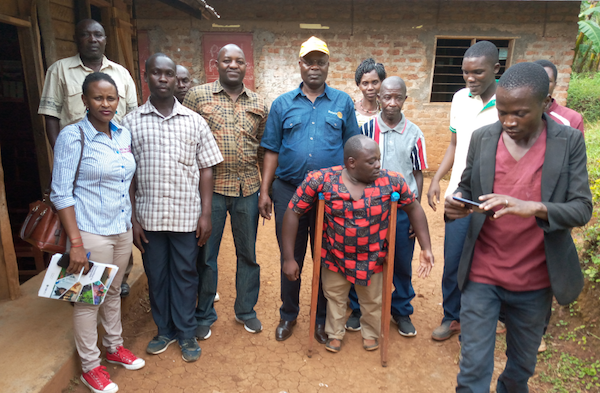
Conducting a financial inclusion sensitization in a rural community that was affected by landslides. Next to me in the yellow cap is the former Deputy Governor of the Bank of Uganda
Despite the opportunities Uganda possesses, the country faces quite a number of challenges ranging from a weak health system; economic structure dominated by the services sector; high levels of poverty; endemic corruption; large informal sector; reliance on agriculture; low levels of industrialization; high unemployment levels; poor saving culture, low levels of financial inclusion, government’s failure to invest adequately in the health, education and economic opportunities for a burgeoning young population, a small industrial sector that is dependent on imported inputs such as refined oil and heavy equipment, among others. Overall, productivity is hampered by a number of supply-side constraints, including insufficient infrastructure and lack of modern technology in agriculture.
Over the last year, Uganda’s economy has experienced a slowdown in growth due to the severe impact of the COVID-19 pandemic crisis, a locust invasion and flooding caused by heavy rains. However, with the current COVID-19 pandemic in place, the situation has further exacerbated the above challenges with the negative impacts likely to spill over in the long term. The pandemic has had a significant impact on the economy and livelihoods, and therefore there is a need for firm support mechanisms for the Government to provide vital services, social safety nets and a more robust shock-responsive system for the long term, to enable the economy recover faster.
What led you to GRIPS? What is the most important thing you got out of your studies here, and how has your experience at GRIPS prepared you for future endeavors?
For me, I had for long been searching for a university that could offer me quality education, refine my management and leadership skills, and develop further my knowledge about public policy. It is not until I read about what GRIPS offers that I finally found that this was the perfect university for me to achieve my dream. In 2014, I was privileged to have received a No Objection from the Bank to study at GRIPS. Bank of Uganda had actually for the last fifteen years encouraged its staff to take on study opportunities at GRIPS, and this was well-publicized. My studying at GRIPS nurtured me into a confident and competent person in what I do, and I humbly owe this to all my professors and staff of GRIPS, as well as all my friends who studied at GRIPS. My experience at GRIPS will in no doubt take me a long way as a fine leader who will surely make a development impact on society.
Have you had any involvement, professional or otherwise, with Japan since your graduation?
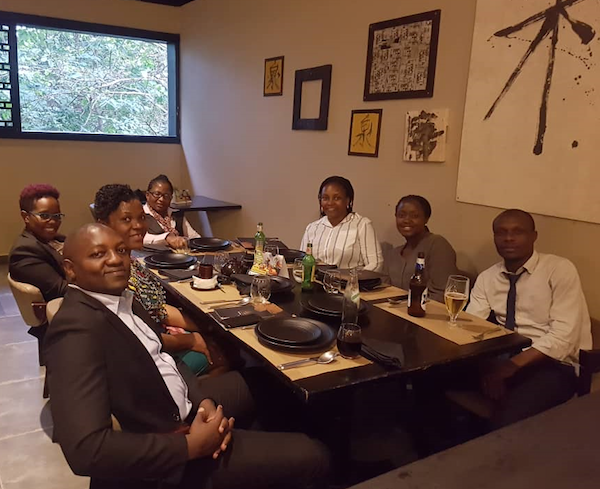
GRIPS alumni meeting at a Japanese restaurant in Uganda
After I returned from Japan in September 2018, I have continued to maintain the networks that I made in Japan and have kept in touch with the so many friends I met in Japan. I have continued to keep in touch with my professors and am always delighted when we share experiences with my former professors and classmates. I feel so privileged to have studied in Japan as my experience and exposure in Japan have had a serious impact on my way of life and always strive to contribute to strengthening the ties between Uganda and Japan.
I am also in constant touch with the Japan Ambassador to Uganda and have occasionally met to discuss various partnership issues that the two countries can benefit from each other. In addition, the Uganda Embassy in Japan has continued to keep in touch with me and I have on several occasions offered technical and non-technical support to the Embassy.
As former students of GRIPS residing in Uganda, we have made it a point to always keep in touch and meet up once in a while to keep the bond amongst ourselves. At the moment we have resolved to get fully organized as alumni and this will go a long way in furthering our love and support for Japan.
How do you maintain a balance between your work and the rest of your life? And what is your favorite thing to do when you are not working?

Teaching Junior school children football in Odaiba
It is quite a challenge to achieve equilibrium in regards to work-life balance because equally prioritizing the demands of work and the demands of one’s personal life is no easy task. Whereas my work is quite involving, I always ensure that I also prioritize quality time for myself and with my family.
Apart from my usual work, I do a lot of volunteer work, especially in less privileged communities. I have participated a lot in engagement programs that focus on financial inclusion and access to finances, education, water and sanitation and health sensitizations.
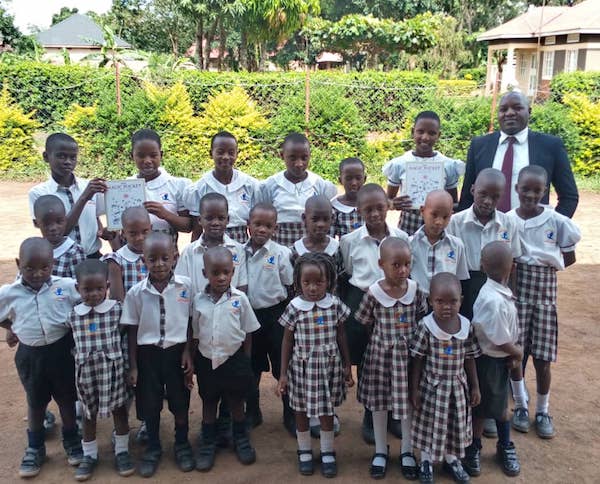
With puplis of the Sterling Primary School of which Benedict is a Director and Founder
I am also very passionate about education and take pride in SDG 4 that focuses on the education goal. Currently, I am one of the founding members of Sterling Nursery and Primary School, a local school located in Luweero District, one of the districts that was ravaged during the war in 1986 in Uganda. The majority of the pupils in the school hail from relatively poor households that cannot easily afford quality education. The school was set up with the main objective of extending quality education to poor rural households. In addition, because of high levels of early child drop-out rates from school, the school thrives to address high drop-out rates by ensuring more children are kept in school (especially the girls), as it is assumed that a good educational foundation has a positive impact on development and growth. The school, now in its second year, has made tremendous progress in providing quality education to the underprivileged children. The school boasts of qualified teachers and knowledgeable directors who are determined to create a positive impact on society.
What are some of your fondest memories of your time spent at GRIPS? And what do you miss about Japan?
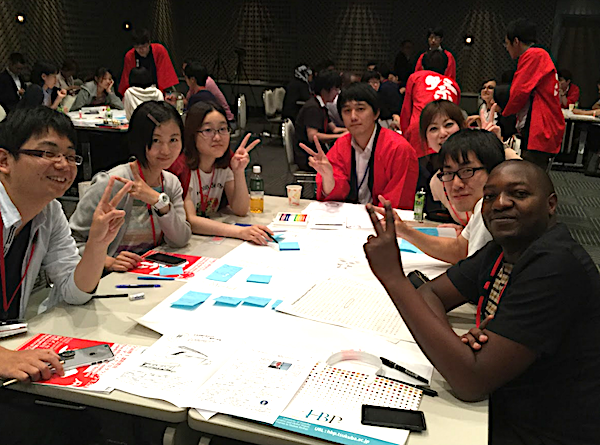
Attending one of the academic sessions in NagoyaAs a student in the Global Governance Program (GCUBE – 2nd Batch), I was privileged to participate in various academic and non-academic sessions that were quite enriching and of course, this helped me to build networks with professors and students from various countries.
It was quite amazing and interesting to me how Japan is so organized and the people there are so kind. Many times when I had just come to Japan, me and my classmates occasionally got lost in the train stations (Shinjuku and Shibuya to be precise), but we always got supportive help from passengers each time which made our lives so easy.
Amongst the many fond memories was the internship opportunity at the Global Financial Partnership Center (GLOPAC), Japanese Financial Services Agency (JFSA). Being an intern at one of Japan’s most famous and well-respected institutions was a great opportunity to listen to many high profile professionals from the insurance field. I also gained a better understanding of Japan’s labor force, business etiquette and lifestyle, norms that are very crucial for a mid-career professional like me.
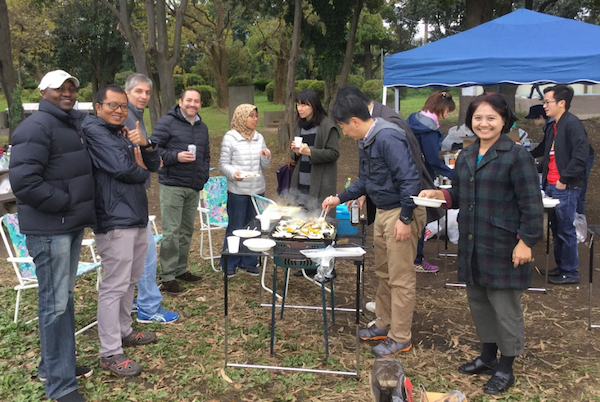
GLOPAC interns having an outing
When it comes to infrastructure, I terribly miss the efficient trains and well-organized setting of the country. Notwithstanding the above, I miss Japanese food and culture, and will definitely make a tour trip back to Japan as I have very fond memories and high respect for Japan.
Another fond memory for me while in Japan was during the summer when I used to participate in transferring football skills to junior school children and also participated in art festivals in Odaiba. This was important for me to refresh and relax from the heavy book workload.
If you could give one piece of advice to anyone considering studying at GRIPS what would it be?
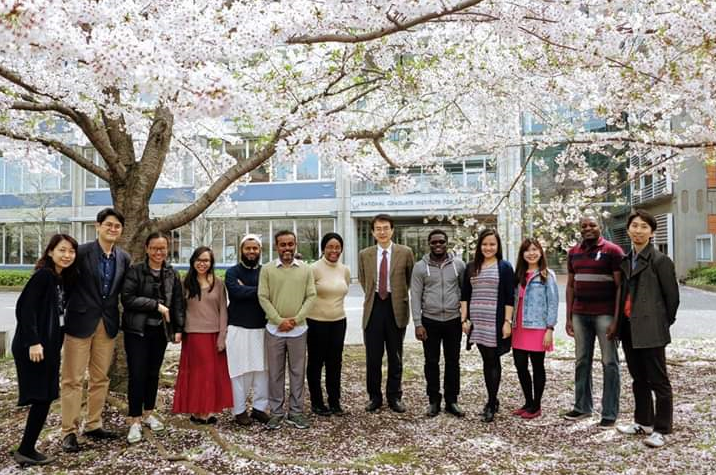
G-CUBE class with the Program Director Professor Sonobe and Coordinator Maekawa-san
GRIPS to me is “Second to None”. The University is highly recognized worldwide and provides a multi-cultural experience that is unique and quite favorable. The teaching methodology, the warm professors, the university ambience and learning environment, the famous GRIPS Forum and other numerous seminars, and the academic & support staff at GRIPS make the university a one-stop place for one to achieve a high-level academic background. GRIPS nurtured me to become a “Leader of Leaders” and therefore I encourage anyone looking to achieve an all-round education experience to look no further than GRIPS.
How would you like to maintain involved with the School? What do you expect from GRIPS as an alumnus and do you have any suggestions on how to further utilize the GRIPS alumni network?
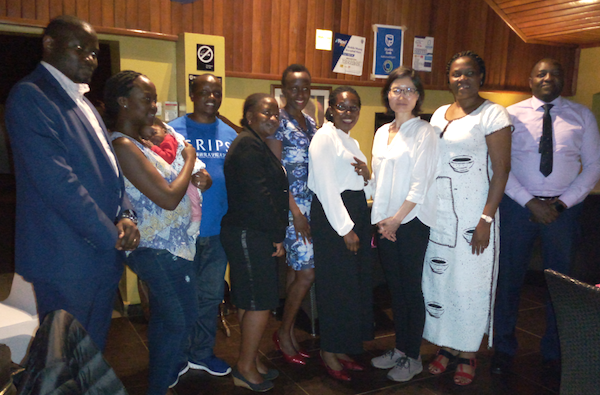
GRIPS alumni hosting Professor Yoko Kijima during one of her visits to Uganda
From GRIPS, I made numerous networks from experts in various fields hailing from various countries. This is important because having the opportunity to exchange opinions, ideas and advice from a multiplicity of people makes a difference in our decision-making process, and this is an asset we all carry from GRIPS. The recently concluded GRIPS global web reunion this year was a brilliant and creative initiative that brought many of us around the world together. I was so delighted to be part of such a mammoth gathering, seeing my former professors and meeting new alumni. Such forums are excellent for enhancing further relations between the alumni network. I would propose that we have such engagements more often.





